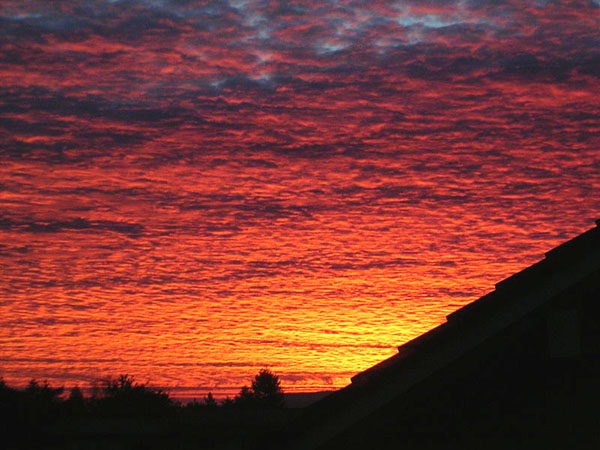 |
| "Red sky at morning..." (Wikipedia) |
Note: Some weather lore is pretty accurate--and some is really not. In this lesson we'll look at some sayings that are usually reliable.
Get Ready: Can you think of any old proverbs that are usually or always true?
In Lesson #01-076, we discussed old-time expressions--many still in use--that helped people predict the weather. We explained that weather in the middle latitudes (30-60 degrees north) usually moves in a band from west to east, alternating high pressure (fair) and low pressure (stormy) systems.
Let's continue today looking at relatively accurate weather predictors.
This expression predicted the weather in a very precise way, though it wasn't always accurate:
"Red sky at night, shepherd's delight;
"Red sky at morning, sailor's warning."
Sometimes this expression uses "shepherds" twice, and sometimes "sailors." I like it this way because I think a shepherd wants a clear night for watching his sheep, and a sailor wants a clear day for sailing.
Is this saying true? Often, yes. Remember that low and high systems tend to alternate, moving from west to east.
So if the sun rises in a moist (red) environment, a storm has just passed, and the day should be fair. But if the sun sets in a moist (red) sky, another storm must be on its way.
The problem is, if no "weather" is happening--if the systems are holding their places--you might have red sunrises and red sunsets, or neither.
Here's an expression that also talks about moisture in the air:
"Ring around the moon, rain before noon."
The same idea is also expressed like this:
"When a halo rings the moon or sun, rain's approaching on the run."
A "ring [or halo] around the moon" is caused by excessive moisture in the air, which often happens before a storm.
Animal behavior can also be a clue to weather changes. Often, their activity is increased as a low-pressure system approaches. Birds may be louder or sing at odd times, giving us this expression:
"When the rooster crows before bed,
"He will wake with a watery head."
(I can tell you as a long-time schoolteacher, the cafeteria was always noisier when rain is on the way! Kids and animals get energetic when the air pressure changes!)
On the other hand, when the bad weather is very near, the animals may seek shelter:
"When the bees stay at home, rain will come.
"When bees fly away, it will stay fine all day."
Here's one more about birds:
"If birds fly low
"Expect rain and a blow."
During times of high pressure, birds can fly relatively higher. When a low-pressure front is moving in, the birds will stay closer to the ground.
So much for relatively accurate expressions. In Lesson #01-078, we'll look at expressions that just aren't true.
--------Read more: https://en.wikipedia.org/wiki/Red_sky_at_morning
Practice: Match the beginning of the weather saying to its description below.
- "Red sky at night... Red sky at morning..."
- "Ring around the moon..."
- "When the rooster crows before bed..."
- "When the bees stay at home..."
- "If birds fly low..."
- A halo tells us what will happen the next morning.
- They make honey and predict the weather!
- Tells people in certain professions what to expect
- Even aircraft can be grounded in a bad storm!
- A weather warning from the barnyard
Answers are in the first comment below.
Submitted to the Shenzhen Daily for February 26, 2008


Answers to the Practice: 1. c; 2. a; 3. e; 4. b; 5. d
ReplyDelete